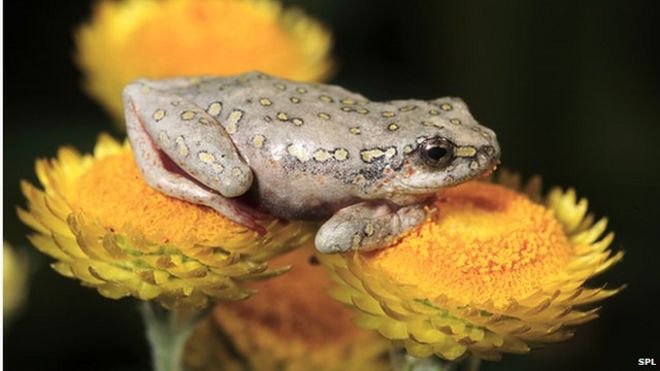Climate change risk
One in six species on the planet could face extinction if nothing is done to tackle climate change, analysis suggests.
If carbon emissions continue on their current path - and temperatures rise by 4 degrees - 16% of animals and plants will be lost, according to a review of evidence.
The study, published in Science, shows risks are highest in South America, Australia and New Zealand.
Previous estimates range from 0 to 54%.
Dr Mark Urban of the University of Connecticut, US, analysed data from 131 scientific studies on the risk of extinction from climate change.
If carbon emissions continue on their current path - and temperatures rise by 4 degrees - 16% of animals and plants will be lost, according to a review of evidence.
The study, published in Science, shows risks are highest in South America, Australia and New Zealand.
Previous estimates range from 0 to 54%.
Dr Mark Urban of the University of Connecticut, US, analysed data from 131 scientific studies on the risk of extinction from climate change.
Many species will be able to shift their ranges and keep up with climate change whereas others will not
Dr Mark Urban, University of Connecticut
He found that the rate of biodiversity loss is likely to speed up with each degree Celsius rise in temperature.
If future temperatures rise by 2 degrees compared with pre-industrial times, global extinction risk will rise from 2.8% today to 5.2%.
But under the scenario where global warming continues on its current path, 16% of species (one in six) face extinction.
"If the world does not come together and control greenhouse gas emissions and we allow the Earth to warm considerably we will face a potential loss of one in six species," said Dr Urban.
"Many species will be able to shift their ranges and keep up with climate change whereas others will not either because their habitat has disappeared or because they can't reach their habitat anymore."
Unique habitats
Higher extinction risks are predicted for Australia, New Zealand and South America, where there are many species adapted to live in habitats not found elsewhere.
Commenting on the research, Prof John J Wiens of the University of Arizona, said the global extinction risk from climate change might be even higher than 16%, as the majority of studies analysed were from Europe and North America, where extinction risks are lower.
"In South America, the extinction risk was estimated to be 23%," he said.
"Unfortunately, this higher number might better reflect the number of species that might go extinct due to climate change globally, if we consider how the world's species are distributed."
Dr Mike Barrett, Director of Science and Policy at WWF-UK, said the findings echoed its Living Planet Report, which found that populations of vertebrate species have halved since 1970.
"This report looks forward and finds that many species are threatened with extinction if we fail to tackle climate change."
Dr Mark Urban, University of Connecticut
He found that the rate of biodiversity loss is likely to speed up with each degree Celsius rise in temperature.
If future temperatures rise by 2 degrees compared with pre-industrial times, global extinction risk will rise from 2.8% today to 5.2%.
But under the scenario where global warming continues on its current path, 16% of species (one in six) face extinction.
"If the world does not come together and control greenhouse gas emissions and we allow the Earth to warm considerably we will face a potential loss of one in six species," said Dr Urban.
"Many species will be able to shift their ranges and keep up with climate change whereas others will not either because their habitat has disappeared or because they can't reach their habitat anymore."
Unique habitats
Higher extinction risks are predicted for Australia, New Zealand and South America, where there are many species adapted to live in habitats not found elsewhere.
Commenting on the research, Prof John J Wiens of the University of Arizona, said the global extinction risk from climate change might be even higher than 16%, as the majority of studies analysed were from Europe and North America, where extinction risks are lower.
"In South America, the extinction risk was estimated to be 23%," he said.
"Unfortunately, this higher number might better reflect the number of species that might go extinct due to climate change globally, if we consider how the world's species are distributed."
Dr Mike Barrett, Director of Science and Policy at WWF-UK, said the findings echoed its Living Planet Report, which found that populations of vertebrate species have halved since 1970.
"This report looks forward and finds that many species are threatened with extinction if we fail to tackle climate change."

No comments:
Post a Comment